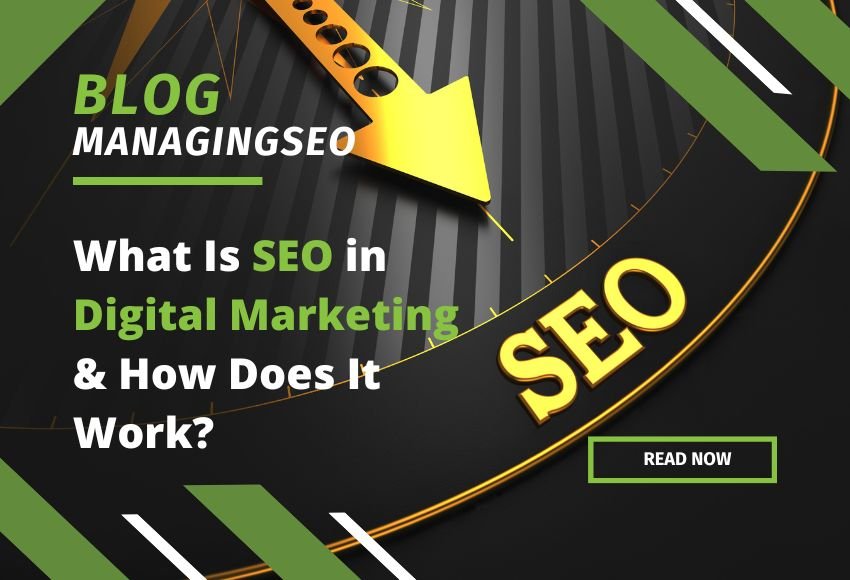
What Is SEO in Digital Marketing & How Does It Work?
Digital Marketing is a term that we use to talk about all the different ways businesses use the Internet to reach people. You might see ads on your favorite website, get emails from stores where you shop, or see posts from businesses on social media. All these are part of digital marketing.
Now, let's talk about something very important in digital marketing. It's called SEO, which stands for Search Engine Optimization. It might sound complicated, but it's actually pretty simple. When you search for something online, you use a search engine like Google. SEO is a way for businesses to ensure their website shows up when people search for things related to what they do or sell.
What is SEO?

So now we know that SEO stands for Search Engine Optimization. But what does it really mean? Imagine you're looking for a new book to read.
You might search “best new books” on Google.
Google then shows you a list of websites that might have what you're looking for. SEO is how businesses make sure their website is on that list.
SEO is very important for businesses. Think about how often you click on the second or third page of search results.
Not often, right?
Most people click on the websites on the first page. So, for a business, being on that first page can mean more people visiting their website, which can lead to more customers. That's why SEO is a key part of digital marketing.
Read More: How to Choose a Good SEO Company in Pakistan
Understanding How Search Engines Work
Let's take a journey into the world of search engines. It starts with something called ‘crawling and indexing.'
Here, search engines like Google send out robots, known as ‘crawlers' or ‘spiders,' to discover new and updated content on the web.
Think of these robots as scouts, scanning websites and then making a ‘map' of the internet. This process is called ‘indexing.'
This map is then stored in a huge database, ready to be retrieved when needed.
Next, we have ‘search algorithms. These are complex sets of rules used by search engines to provide the best results for a search. If you've ever wondered how Google knows just what you're looking for, this is how. They match your search terms with the information they've indexed.
Lastly, ‘relevance and ranking' come into play.
Once a search engine has a list of potential matches for your search, it needs to decide what to show you first. This is done by ranking the results based on their relevance to your search and the website's overall quality. The more relevant and high-quality a website is, the higher it will rank.
Types of SEO

On-Page SEO:
This type of SEO is all about the content and elements of a website. It includes optimizing ‘keywords,' which are the terms that people type into search engines. By using these keywords in the website's content, title tags, and meta descriptions, a site can increase its visibility to search engines. Even the website's ‘URL structure' plays a part, as it should be clear and easy to understand.
Off-Page SEO:
This deals with elements outside of the website that can affect its ranking. ‘Backlinks,' which are links from other websites to yours, are a big part of this. When other websites link to yours, it signals to search engines that your content is valuable. ‘Social signals' and ‘brand mentions,' where your brand is discussed on social media or other platforms, also contribute to off-page SEO.
Technical SEO:
This is all about the technical aspects of a website that affect its performance.
Things like ‘site speed,' how quickly your website loads, and ‘mobile optimization,' ensuring your site looks good and works well on mobile devices, are crucial.
‘Site architecture' and ‘XML sitemaps,' which help search engines understand the structure of your site, are also part of technical SEO.
The Role of Content in SEO
Quality content plays a starring role in SEO.
But what does ‘quality content' mean?
It's content that is interesting, valuable, and engaging for users. This type of content encourages visitors to stay on your website longer, increasing their chances of becoming customers.
‘Keyword usage' in your content is important too. Using the terms, people are searching for in your content can help search engines understand what your site is about. This can improve your site's visibility in search results.
Finally, ‘content freshness' can impact SEO. Search engines prefer websites that regularly update their content, as this indicates the site is active, and the information is current. So keep your content fresh and up-to-date to give your SEO a boost!
Local SEO

Now let's talk about Local SEO.
It's a lot like regular SEO but with a local twist. This means it's all about making your business more visible in search results in your local area.
So, if you own a pizza shop in New York, you'd want your business to pop up when someone in New York searches for ‘pizza near me.'
This is super important for small and local businesses. Think about it. If your business only serves people in your local area, it's not much use showing up in search results for people on the other side of the country. So, if you want more local customers to find your business, Local SEO is the way to go.
SEO Tools and Software
SEO can be tricky, but luckily there are lots of tools and software out there to help. These tools can help you understand how well your SEO efforts are working. They can show you what's working well and what needs to be improved. This can make your SEO strategy more effective.
There are many SEO tools available in the market. Some popular ones include Google Analytics, which can show how people find and interact with your website, and Keyword Planner, which can help you figure out what keywords to use. There's also Moz, which offers a range of SEO tools, and SEMrush, which can help you analyze your website and your competitors.
Remember, using these tools can help you make the most of your SEO efforts. So don't be afraid to give them a try.
SEO Best Practices
There are several best practices to make your website more friendly for search engines.
Optimizing for mobile
One of them is ‘Optimizing for Mobile.' More and more people are using their phones to go online. So, your website needs to look good and work well on a small screen.
User experience

User Experience is another key practice. This means your website should be easy and enjoyable for people to use. If visitors find your site confusing or hard to navigate, they'll likely leave and go somewhere else.
Read More: Why User Experience Is Vital for Quality SEO
Voice search optimization
Voice Search Optimization is becoming more important too. More people are using voice assistants, like Siri or Alexa, to search the internet. So, your website should be ready for this kind of search.
Structured data and schema
Lastly, there's ‘Structured Data and Schema.' These are instructions that help search engines understand what's on your website. By using these, you can help search engines index your site more accurately.
The Future of SEO
Looking to the future, there are some exciting developments in SEO.
Artificial Intelligence and ‘Machine Learning' are playing a bigger role. These technologies can help search engines understand content and user behavior even better.
Core Web Vitals‘ and ‘User Experience' are becoming more important too. This measure how quickly your website loads, how easy it is to interact with, and how stable it is when people use it.
And lastly, the impact of ‘Voice Search' and ‘Mobile Search' is likely to keep growing. As technology evolves, SEO will have to evolve, too, to keep up with new ways of searching.
FAQs
What is a keyword in SEO?
In SEO, a ‘keyword' is a word or phrase that people might type into a search engine when they're looking for something. For example, if you're looking for a nearby pizza place, you might type ‘pizza near me.' That's a keyword. Businesses use these keywords in their website content to help search engines understand what their website is about. This can help their website show up when people search for those keywords.
What does ‘optimizing for mobile' mean?
Optimizing for mobile means making sure your website looks good and works well on a mobile device, like a smartphone or tablet. As more people use their phones to go online, it's important for websites to be ‘mobile-friendly.' This can involve things like making sure text is easy to read; links are easy to click, and the website loads quickly on a mobile device.
How does voice search affect SEO?
Voice search is when people use voice commands, instead of typing, to search the internet. They might use a voice assistant, like Siri or Alexa, to do this. Voice search can affect SEO because people often use more natural, conversational language when they speak. So, instead of typing ‘weather New York,' they might say, ‘What's the weather like in New York today?'. To optimize for voice search, websites might need to consider these more conversational keywords in their content.
Conclusion
SEO, or Search Engine Optimization, plays a huge role in digital marketing. It helps businesses get noticed in search results, attract more visitors, and ultimately, win more customers.
It might seem like a lot to take in with different aspects like On-Page, Off-Page, Technical SEO, and Local SEO. But businesses can improve their online visibility by following SEO best practices and using SEO tools.
As technology continues to evolve, SEO will too. But no matter what changes come, one thing remains the same: SEO is a powerful tool for businesses. So, whether you're a small local shop or a big online store, SEO can help you achieve your business goals.
Optimize your business's digital growth with ManagingSEO, the number one SEO Agency in Pakistan.
Read More: Top SEO Companies in Pakistan

Leave a Comment